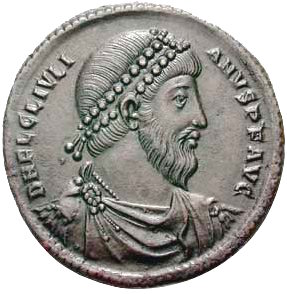 |
| Πορτραίτο του Ιουλιανού σε χάλκινο νόμισμα από την Αντιόχεια, 360-363. |
«Από τη μελέτη των γραφών μας ο καθένας θα γινόταν καλύτερος ακόμα κι αν εστερείτο παντελώς φυσικής ικανότητας. Ένας άνθρωπος όμως προικισμένος από τη φύση, που επιπλέον θα τύχει της ημετέρας παιδείας, δεν είναι τίποτε λιγότερο για την ανθρωπότητα από δώρο των θεών, είτε γιατί θ' ανάψει το φως της επιστήμης είτε γιατί θα ιδρύσει κάποιο πολιτικό σύστημα, είτε γιατί θα τρέψει σε φυγή στρατιές πολεμίων είτε γιατί, εξερευνώντας γη και θάλασσα, θ' αποδείξει μ' αυτόν τον τρόπο την ηρωική του φύση».



